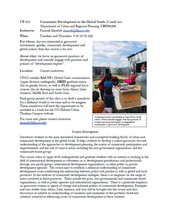
Introduces students to the main theoretical frameworks and conceptual building blocks of urban and community development in the global South. It helps students to develop a critical grassroots focused understanding of the approaches to development planning, the notion of community participation and empowerment, and the role of various actors including the non-government organizations and the community-based groups.
This course caters to upper level undergraduate and graduate students with an interest in working in the field of international development as volunteers or as development practitioners and professionals through non-profit groups, international development organizations, or other public or private development agencies. The course aims to establish a relational understanding of community development issues establishing the relationship between policy and practice as well as global and local processes. In the analyses of community development strategies, there is an emphasis on the range of actors involved in these processes. These include the poor, non-governmental and community-based organizations, as well as public agencies and international organizations. There is a particular emphasis on grassroots women as agents of change and informal politics of community development. Examples and case studies from Africa, Latin America, and Asia will be brought into the course and class discussions to achieve an understanding of variations and similarities of the problems faced and solutions achieved in addressing issues of community development in these contexts.
Instructor Faranak Miraftab faranak@illinois.edu
When Tuesdays and Thursdays: 9:30-10:50 AM